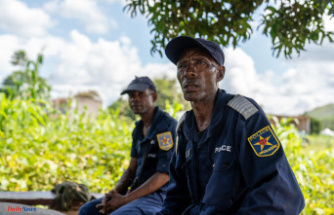The number of refugees is growing on the Balkan route. Tens of thousands of people are also trying to escape the war in Ukraine. The municipalities in Hesse are reacting and are looking for accommodation. But they call on the federal and state governments to help more quickly.
Wiesbaden (dpa/lhe) - With the increasing number of refugees, the Hessian municipalities are expanding their accommodation capacities and sometimes complain about a lack of support from the federal and state governments. In an open letter from the heads of town and district leaders in the Wetteraukreis to the state and federal government, it says: "By taking over the financial expenses, ensure clarity in municipal budget planning."
According to the Ministry of Social Affairs, more than 13,500 regular asylum seekers have been registered for initial reception in Hesse since the beginning of the year. They are distributed nationwide to the states using a fixed key. In addition, since spring 2022, around 73,100 refugees from Ukraine have been assigned to the districts and urban districts by the allocation office at the Darmstadt regional council.
According to the latest information from the EU Commissioner for Migration and Home Affairs, Ylva Johansson, three times as many people are traveling on the so-called Balkan route than in the previous year. Many people came to the EU via this route during the 2015 refugee crisis. The federal police registered almost 58,000 unauthorized entries at the borders by the end of September - with a strong upward trend. According to preliminary figures, there were 12,720 cases in September alone, more than twice as many as a year earlier.
According to the ministry, 7,251 of the approximately 8,000 available places in the initial reception area in Hesse are occupied. In addition, around 280 of the 800 available places in the emergency accommodation in Alsfeld are occupied. The state government is in constant contact with municipalities and municipal umbrella organizations and is therefore aware that the accommodation situation in the municipalities is very tense as a result of the admission of large numbers of both Ukrainian war expellees and asylum seekers, explained the Ministry of Social Affairs.
The state government expects the federal government to meet its joint responsibility for financing the task for society as a whole to an appropriate extent. Discussions are currently taking place between the federal government and the states on the specific design and amount.
Discussions that, according to the municipalities, should be held more urgently. The lump sum granted by the state of Hesse for the accommodation of people under the Asylum Seekers Benefits Act in the amount of 1066 euros for Wiesbaden is, according to the city's assessment, far from sufficient. This was already the case before inflation, but has since worsened again. In the case of social assistance for displaced persons, which has applied to people from Ukraine since June 1, the federal government bears the living expenses, but the municipalities bear 40 percent of the accommodation costs. According to the city, the flat rate does not cover costs in Frankfurt either.
"Communicate at eye level with the municipalities and make the current refugee situation a top priority," says the letter from the Wetterau district. The social welfare office in Kassel criticizes: "There are still no financing regulations, so that the municipalities have been bearing the main burden so far." Darmstadt announced that reimbursements could be claimed from the state and federal government for certain groups of people. But they are not cost-covering. "There is no possibility of reimbursement for personnel expenses - these are fully borne by the municipality."
"The personnel capacities for the care of refugees and war expellees in Marburg are exhausted. If more community accommodations are set up, more staff will be needed," said Marburg. This is also reported by other municipalities.
Although there is still accommodation capacity almost everywhere, those responsible are looking for more accommodation. "The city of Kassel is currently using 48 accommodations with a total of 2,100 places. Capacity is still available and must be expanded in view of the winter and in anticipation of increasing numbers of refugees," said the social welfare office. "The capacities are almost exhausted," said the district of Groß-Gerau.
The influx of people from Ukraine could only be managed with hotel capacities and gyms as emergency accommodation, according to Frankfurt. "As is well known, the housing and real estate market situation in Frankfurt has been very tense for years." This also has an impact on the accommodation of refugees. This leads to long stays in emergency and temporary accommodation because it is extremely difficult to provide follow-up accommodation.
The municipalities assume a further increase in the numbers. 4,100 people from Ukraine have been registered in the Hessian state capital Wiesbaden since March. About 3,500 Ukrainians are still in the city. According to the city, there have also been 350 people from other countries of origin since March who were assigned to Wiesbaden from the initial reception of the state of Hesse or who came as late repatriates or Afghan local workers. The letter from the Wetteraukreis states: "The pure influx of refugees to the Wetteraukreis will increase ninefold within a year from 2021 to 2022 - if a total of 590 refugees arrived in the Wetteraukreis in 2021, according to current forecasts there will be more in 2022 than 5300."












